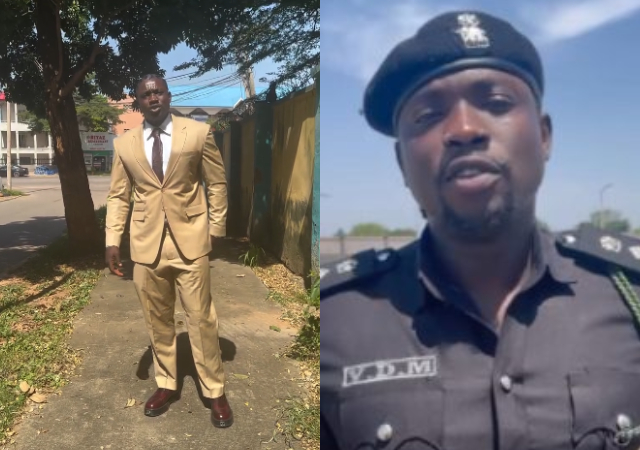Prominent social media influencer VeryDarkMan has been detained by the Nigerian Police Force, marking his second brush with law enforcement in recent times. The arrest, reportedly stemming from his unauthorized use of police uniform, has ignited fierce debate about the intersection of activism, law enforcement, and freedom of expression in Nigeria’s increasingly complex social media landscape.
Sources close to the situation confirm that the controversial figure will face court proceedings tomorrow, where he will answer charges related to the unauthorized wearing of official police attire. This latest development adds another chapter to VeryDarkMan’s contentious relationship with law enforcement, following his previous encounters with authorities and his well-documented criticism of various institutional practices.
The timing and nature of the arrest have sparked intense speculation about potential underlying motivations. VeryDarkMan, who has built a significant following through his bold commentary on social issues and criticism of authority figures, has frequently found himself at odds with various institutions. His supporters argue that this latest arrest might represent an attempt to silence his vocal criticism rather than address a genuine legal concern.
The case has highlighted the complex legal framework surrounding the use of official uniforms in Nigeria. While laws exist to protect the integrity of official symbols and prevent their misuse, the application of these regulations in the context of social media activism and commentary has raised important questions about the boundaries of creative expression and protest.
The incident has divided public opinion, with social media platforms buzzing with contrasting viewpoints. Supporters of VeryDarkMan have launched online campaigns calling for his immediate release, framing the arrest as an infringement on freedom of expression and a form of institutional intimidation. These advocates argue that his use of police uniform, if confirmed, should be viewed within the context of social commentary and protest rather than criminal intent.
However, another segment of the public, including legal experts and law enforcement supporters, emphasizes the importance of maintaining respect for official symbols and uniforms. They argue that allowing unauthorized use of police uniforms could set a dangerous precedent and potentially compromise public safety by creating confusion about legitimate law enforcement presence.
The arrest has also drawn attention to the evolving nature of social media activism in Nigeria. VeryDarkMan’s case exemplifies the increasing risks faced by digital activists who push boundaries in their pursuit of social justice and institutional accountability. His situation has become a flashpoint in discussions about the balance between maintaining law and order and protecting freedom of expression in the digital age.
Legal experts following the case note that the outcome of tomorrow’s court proceedings could have significant implications for social media activism in Nigeria. The ruling may help establish clearer guidelines about what constitutes acceptable forms of protest and commentary, particularly when it involves the use of official symbols and uniforms.
The incident has also raised questions about the relationship between law enforcement and social media influencers who engage in activism. As digital platforms increasingly become spaces for social and political discourse, the need for clear guidelines governing these interactions becomes more pressing.
The timing of VeryDarkMan’s arrest, given his history of criticizing law enforcement, has led to broader discussions about the use of legal mechanisms to manage social media criticism. Some observers argue that this case highlights the need for updated legislation that better addresses the realities of digital activism while protecting legitimate law enforcement interests.
As the nation awaits tomorrow’s court proceedings, the case continues to generate significant attention across social media platforms. The outcome may not only determine VeryDarkMan’s immediate future but could also influence the future landscape of digital activism in Nigeria.
The incident serves as a reminder of the complex challenges facing both law enforcement and social media activists in an era where the lines between online expression and real-world consequences are increasingly blurred. As Nigeria continues to grapple with these issues, the VeryDarkMan case may prove to be a significant milestone in defining the boundaries of digital activism and the use of official symbols in social commentary.
As this story continues to develop, it highlights the ongoing tension between traditional institutional authority and new forms of digital influence, a dynamic that continues to shape Nigeria’s evolving social media landscape. The resolution of this case may well set important precedents for how similar situations are handled in the future.



